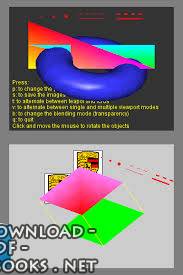📘 ❞ Using OpenGL in Visual C++ ❝ كتاب
كتب سي بلس بلس - 📖 كتاب ❞ Using OpenGL in Visual C++ ❝ 📖
█ _ 0 حصريا كتاب ❞ Using OpenGL in Visual C++ ❝ 2025 C++: C++ by Alan Oursland Copyright © 2000 Interface Technologies, Inc All Rights Reserved Series Overview With the release of NT 3 5, became a part Windows operating system Now with support for 95 and 98 low priced graphics accelerators becoming readily available even on end machines, prospects using any machine is becoming more attractive every day If you are interested creating quality 2 D or in Windows, if already know another variant GL, keep reading This tutorial will show how to use some its basic commands GL is programming interface designed by Silicon Graphics generic version interface made available to wide variety outside vendors interest standardization language OpenGL allows create high images without dealing heavy math usually associated computer handles primitives, transformations, lighting, shading, Z buffering, hidden surface removal, host other features I'll use these topics sample programs following; others leave explore yourself want learn more about can search MSDN website for keyword "OpenGL" Here list topics covered this series: 1 Writing an Program 2 Simple Graphics 3 Transformations Matrix Stack 4 Graphics Writing Program The first program demonstrated here minimum requirements setting up Windows program display As GDI needs Device Context (DC) draw images, OpenGL requires Rendering (RC) Unlike GDI, which each command requires that DC is passed into it, uses concept current RC Once rendering context has been made current thread, all calls thread same While multiple contexts may be used single window, only one be current at time The goal make There three steps making context: 1 Set window's pixel format 2 Create 3 Make Take following steps project: 1 new Project Workspace type "MFC AppWizard (exe)" Select directory where you project created, "GLSample1" as name Click "Create" enter Following the parameters should them Any parameters not listed optional Single Document Interface 3 Database support: None 4 Compond Support: None كتب سي بلس مجاناً PDF اونلاين سي++ (تنطق: بلس) (بالإنجليزية: ++C) هي لغة برمجة كائنية متعددة أنماط البرمجة مصرفة سكونية الأنماط وتضم العديد من ميزات لغات عالية المستوى ومنخفضة بدأ تطوير هذه اللغة امتدادًا للغة تحت اسم (سي مع الأصناف) قبل بيارن ستروستروب مختبرات بل عام 1979 وتم إضافة الميزات الأخرى لاحقاً وتغير الاسم 1983 ليصبح باب الدعابة عبر استخدام معامل الزيادة لجانب تأكيداً أنها «التالي سي» تعتبر إحدى اللغات الأكثر شيوعاً وقد استخدمت نطاق واسع بناء أنظمة التشغيل والتعامل البنية الصلبة للحاسوب ابتداءً الأنظمة البرمجية وبرامج المستخدم مروراً بمشغلات الأجهزة والأنظمة المضمنة وانتهاءً بالخوادم الأداء التسلية كالألعاب الفيديوية نظراً لقدرة تصريفها إلى كود تجميع شديد الفعالية أحد أكثر استخدامات إثارةً للإعجاب حسب رأي هو كتابة قسم كبير القيادة الأوتوماتيكية للعربات التي تجولت سطح المريخ (مارس روفر)
- مساهمة من: Alan Oursland
( الأحد 11 مايو 2008 ( 3:00 مساءً )) - تبليغ عن سوء استخدام
Using OpenGL in Visual C++
by Alan Oursland
Copyright © 2000 Interface Technologies, Inc. All Rights Reserved.
Series Overview
With the release of NT 3.5, OpenGL became a part of the Windows operating system. Now with support
for OpenGL in Windows 95 and Windows 98 and low priced graphics accelerators becoming readily
available even on low end machines, the prospects of using OpenGL on any Windows machine is
becoming more attractive every day. If you are interested in creating quality 2-D or 3-D graphics in
Windows, or if you already know another variant of GL, keep reading. This tutorial will show you how to
use OpenGL and some of its basic commands.
GL is a programming interface designed by Silicon Graphics. OpenGL is a generic version of the interface
made available to a wide variety of outside vendors in the interest of standardization of the language.
OpenGL allows you to create high quality 3-D images without dealing with the heavy math usually
associated with computer graphics. OpenGL handles graphics primitives, 2-D and 3-D transformations,
lighting, shading, Z-buffering, hidden surface removal, and a host of other features. I'll use some of these
topics in the sample programs following; others I'll leave to you to explore yourself. If you want to learn
more about OpenGL you can search the MSDN website for the keyword "OpenGL".
Here is the list of topics covered in this series:
The first program demonstrated here will show you the minimum requirements for setting up a Windows
program to display OpenGL graphics. As GDI needs a Device Context (DC) to draw images, OpenGL
requires a Rendering Context (RC). Unlike GDI, in which each GDI command requires that a DC is
passed into it, OpenGL uses the concept of a current RC. Once a rendering context has been made
current in a thread, all OpenGL calls in that thread will use the same current rendering context. While
multiple rendering contexts may be used to draw in a single window, only one rendering context may be
current at any time in a single thread.
The goal of this sample is to create and make current an OpenGL rendering context. There are three
steps to creating and making current a rendering context:
"Create" to enter the AppWizard. Following is a list of the steps in the AppWizard and the
parameters you should enter in each of them. Any parameters not listed are optional.
#24K
0 مشاهدة هذا اليوم#27K
1 مشاهدة هذا الشهر#17K
13K إجمالي المشاهدات- 🎁 كن أول كاتب اقتباس في هذه الصفحة واحصل على هديّة 15 من النقاط فوراً 🎁

